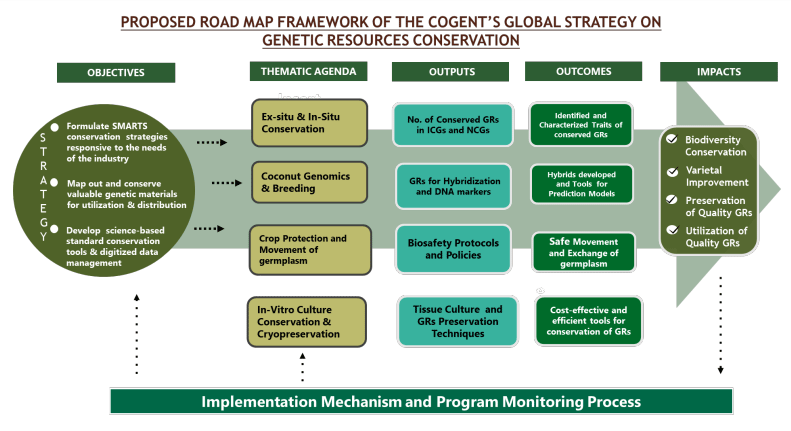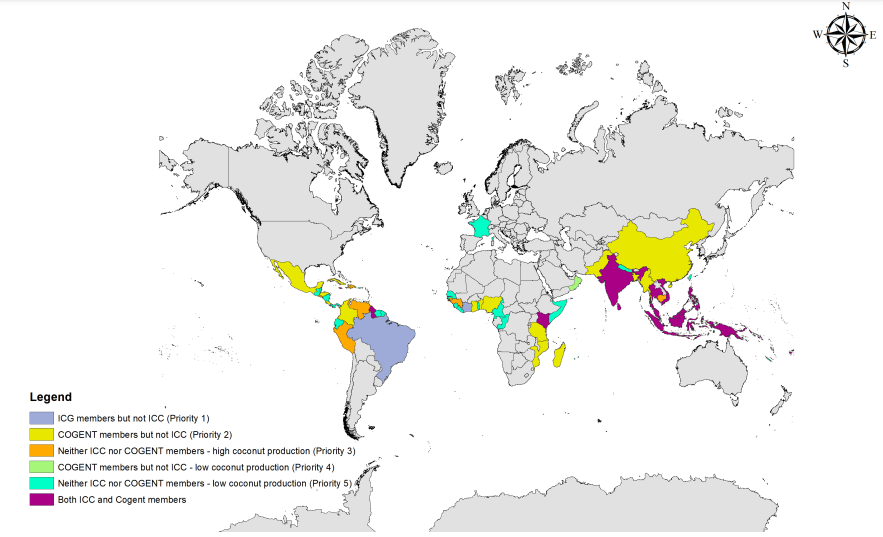COGENT’s ROAD MAP: UNIFIED DIRECTIONS AND STRATEGIC FUNCTIONS
During the workshop the COGENT coordinator presented COGENT’s strategic roadmap, highlighting the ITAGs’ role in implementing COGENT’s strategy, and outlining each ITAG’s thematic agenda, outputs and outcomes drafted in the one week’s meetings. With the guidance of the SC members and panel of critics, the ITAGlinked issues include a) conservation capacity building; pest studies; germplasm collection, conservation (ex- and in-situ), characterization and utilization (breeding and commercially); smallholders as beneficiaries;  COGENT and ICC membership; a stronger, time-bound strategic alignment of COGENT with ICC and its collaborators such as CIRAD and ACIAR, as well as the private sector; reviewing ICG host-country policy and other support, and biosecurity. In situ conservation featured frequently in the discussion. ITAG leaders then each presented summaries of their strategic reflections for more effective and sustainable germplasm management and exchange. The crafted ITAGs logframe as presented focused in the four sustainability components such as: i) industry-responsive technology development; ii) ITAGs R&D program sustainability; iii) ITAGs synergy enhancement; and iv) the ITAG’s investment plan. For each area, the groups listed their priority areas, strategies to address challenges, outcomes of implementing the strategies, activities needed and the monitoring indicators.
COGENT and ICC membership; a stronger, time-bound strategic alignment of COGENT with ICC and its collaborators such as CIRAD and ACIAR, as well as the private sector; reviewing ICG host-country policy and other support, and biosecurity. In situ conservation featured frequently in the discussion. ITAG leaders then each presented summaries of their strategic reflections for more effective and sustainable germplasm management and exchange. The crafted ITAGs logframe as presented focused in the four sustainability components such as: i) industry-responsive technology development; ii) ITAGs R&D program sustainability; iii) ITAGs synergy enhancement; and iv) the ITAG’s investment plan. For each area, the groups listed their priority areas, strategies to address challenges, outcomes of implementing the strategies, activities needed and the monitoring indicators.
The main concern of ITAG 1 in collaboration with other ITAGs are capacity building; support to operations of ICGs / NCGs ; business plans of income-generation for ICGs/NCGs, and issues on intellectual property rights. Moreover, ITPGRFA Article-15 agreement renewals is of utmost priority, establishing new (multi-country) ICGs; accessions’ availability and duplication; biosecurity; germplasm characterization guidelines and data management process; broadening ITAG1’s approach; evaluating the impact of germplasm exchange, and ensuring genebank standard operating procedures (SOPs). For ITAG 2, lack of coordinated breeding programs, wherein COGENT member countries are conducting their own programs for yield and quality. Moreso, a study on safe movement of coconut pollen has to be given attention. Inter-ITAG collaboration should focus on : i) using coconut pollen for varietal development (pollen collection to follows STANTECH); ii) varietal development information sharing; iii) germplasm characterization for molecular-marker-assisted breeding; iv) Pangenomic studies with ITAG 1 between suggested participating countries; v) applying (“OMICS”) tools for conservation and use of coconut genetic resources; and vi) establishing ‘strategic alliances’ with already existing genomic research team and set-ups. ITAG 3 concerns were: i) importance for ITAGs role in conserving ICG accessions, especially regarding germplasm exchange biosecurity protocols to prevent spread of key problems such as lethal yellowing phytoplasmas; ii) remote/satellite imaging tools for disease mapping for monitoring; young researchers’ field training for new technologies; and iv) public-private funding partnerships. Further, disease/pest resistance should be documented and integrated into improvement programs, including using genomic analyses. Safe routes for germplasm movement need certification (e.g. embryo exchange). For the logframe of ITAG 4, the emphasis was on the priority research program for Coconut Tissue Culture (CTC) and cryopreservation which were articulated by the group. The Coconut Somatic Embryogenesis technology (CSEt) which can be commercialized based on the report of Dr. Carlos Oropeza of CICY of Mexico. However, after further deliberation of ITAG4 team, field evaluation and acclimatization studies should be conducted in various environmental conditions. In the case of the Axillary Shoot Tissue Culture (ASTC) protocol developed by the team of Dr. Bart Panis of Belgium, and this has been successfully replicated in India and Sri Lanka. Accordingly, patenting of the protocol is to protect free use for smallholders and researchers. The recent CTC and cryopreservation protocols training held in CPCRI, India in May, 2022 is yet to be evaluated.
EXPANDED COGENT’S MEMBERSHIP AND TEAM LEADERSHIP OF ITAGs

During the worskhop, there are cross-cutting ITAG issues to be addressed and areas that need improvement. COGENT must improve communications to promote the ITAGs relevance and their membership composition, with ITAGs meetings to be held every 3 months. The key challenge in organizing ITAGs is to connect with focal points in some countries and hitches due to limited resources. The crosscutting socioeconomics aspects of the ITAGs deliverables is vital in getting the interest of the private sectors and the attention of donor agencies. Linking research to the social and economic impact is the channel to attract investors. A socio-economist experts could help with developing business plans for the income-generating activities of ICGs/NCGs and investment portfolio for the ITAGs developed technologies. SC Chairman Alan Aku, discussed the SC role and structure, and 2021 recommendations were presented. SC agreed that nominations for new ITAGs Team Leaders, SC Chair & Vice Chair will be administered virtually by the COGENT coordinator. Nomination forms will be circulated and nominations will be conducted virtually. COGENT membership needs harmonizing, with clear terms of reference and policy guidelines, linked to ICC policies. ICC member-countries should be automatically be members of COGENT.
The list of COGENT National Focal Points (NFPs) needs updating with the corresponding enlisted government support, and should include nominating younger representatives. This should feature NFPs at appropriate policy level as appointed by the host countries. Relevant research institutes from ICC member countries could be nominated as non-paying associate COGENT membership to include. private-sector organizations or institutes from non-ICC member-countries and can be levied a member fee. Engaging regional organizations as associate ICC members (e.g., Coconut Coalition of America) may assist with resource mobilization. One CGIAR should be invited for ICC representation. Whereas to non-ICC members subscribe to ICC free COGENT membership would be a bonus. ICC should rearticulate the 78 benefits of joining COGENT as part of ICC membership. In reviewing its membership policy, COGENT needs to consider who are its customers, and how COGENT can meet its needs for resources. Sustainable funding could be generated by industry levies; funds from the Crop Trust (e.g.as for coffee), or payments for ecosystem services / green climate funds (e.g. for carbon sequestration). ICG income generation should be a feature of sustainability plans. Sustainability plans should include training in monitoring, germplasm exchange and biosecurity. There needs to be business mapping and wider involvement of coconut value-chain stakeholders, especially with industry stakeholders and host countries.
